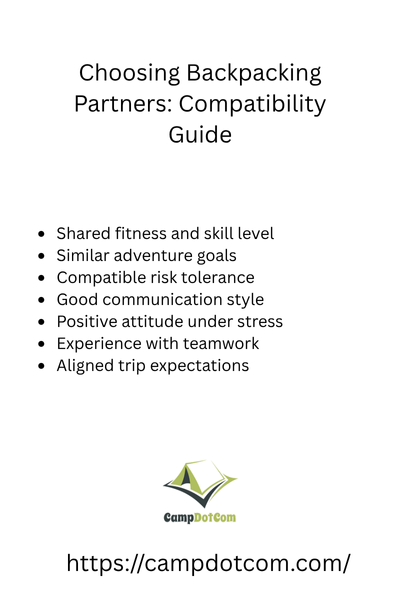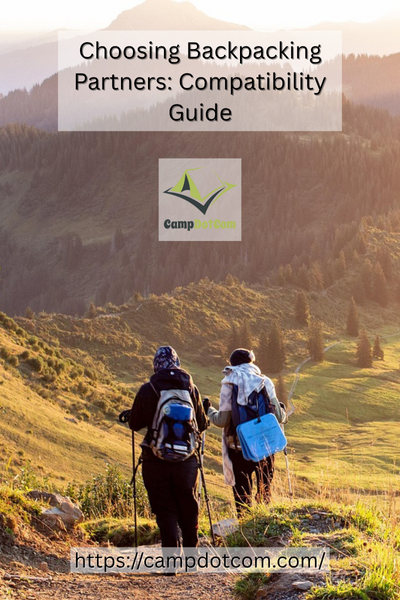Choosing backpacking partners might seem like a small thing, but it can really shape your whole adventure.
I found this out the fun way. There I was, halfway up a mountain with a heavy pack, and my hiking buddy suddenly decided it was the perfect moment for a nap. Right there on the trail. In the sun. With the snacks I had been saving. Let’s just say I learned a lot about patience that day.
If you’ve ever dreamed of an amazing outdoor trip with a friend, your partner, or someone from your hiking group, keep going.
As an Amazon Associate, I earn from qualifying purchases. Some of the links in this article are affiliate links. This means that, at zero cost to you, I will earn an affiliate commission if you click through the link and finalize a purchase.
The best partner is not the one with the fanciest gear or the fastest pace. It is the one who fits well with your style, your energy, and yes, your snack habits too.
Read More About Choosing Backpacking Partners

Why Compatibility Makes or Breaks a Trip
When you’re out there in the middle of nowhere, sweating, hungry, and maybe just a little sunburned, you start noticing everything about your partner. Like, do they take forever to pack up camp? Do they snore louder than a bear? Do they hog the water filter?
More Things to Know About Choosing Backpacking Partners

Choosing backpacking partners isn’t just a handy checklist—it’s a mindset. It helps you figure out if the person you’re about to spend 24/7 with in unpredictable conditions is going to lift you up… or drive you absolutely bonkers.
Trail Goals: Are You on the Same Path?
One of the first things you’ll want to chat about, even before your boots touch the trail, is what you each hope to get out of the trip.
Are you both in it for the Instagram-worthy sunrise shots? Or is one of you secretly training for a mountain ultra and thinks breaks are for quitters?
I once went on a trip with a guy who wanted to do 20 miles a day, every day. I wanted to take photos of wildflowers. You can imagine how that went.
When choosing backpacking partners, talk goals. Be honest. If one of you wants to power hike and the other wants to journal by a lake, that’s a mismatch waiting to happen.
Pace, Patience, and Pee Breaks
It might sound silly, but pace compatibility is huge. If one of you is sprinting up hills while the other is sucking wind and pretending to admire the view (yes, that was me), it creates tension fast. No one wants to feel like they’re holding the group back—or constantly waiting.
Try doing a test hike together. You’ll learn a lot: who’s always “five more minutes” late, who forgets socks, and who packs the best trail mix. It’s a little like dating, but with more blisters.
Communication Is Your Compass
I know, I know—”communication is key” sounds like a cheesy poster in a school counselor’s office. But when you’re on the trail and something goes wrong (and it will), you need to know your partner won’t freeze up or start finger-pointing.
Selecting backpacking partners tip? Watch how they handle stress. A flat tire on the way to the trailhead or a forgotten stove can reveal a lot about a person’s problem-solving style. Do they adapt? Panic? Blame you for everything?
Trust me, it’s better to find out during a short weekend trip than two days into a weeklong trek.
Personalities and Pet Peeves
Some people love to chat the whole way. Others are in it for the solitude. Some want to hike in silence and absorb the scenery. Others want to narrate their thoughts like a podcast you didn’t subscribe to.
Neither is wrong—but mixing the two can be a rough combo.
And don’t forget the small stuff. Are they messy in camp? Do they snore? Will they actually split chores? Do they eat all the cheese and deny it later? (Not bitter, just still hungry.)
Gear and Preparedness: Who’s Carrying What?
Another overlooked part of compatibility? How you share responsibilities and gear. Are you both bringing stoves and accidentally doubling up, or is someone assuming you’ll carry everything?
A quick gear-planning chat before the trip can save you from carrying 15 pounds of “just in case” stuff because your partner’s more of a minimalist (or, let’s be real, unprepared).
Unlock New Trails by Choosing Compatible Backpacking Partners
At the end of the day, choosing backpacking partners boils down to finding someone who makes the tough miles feel lighter, not heavier.
Choose someone who’ll laugh when it rains, share their last granola bar, and maybe sing off-key with you when morale’s low.
Your best hiking buddy might not be your best friend off the trail—and that’s okay. But when you find that magical mix of rhythm, goals, and good humor? That’s when backpacking becomes more than just walking with a heavy pack. It becomes unforgettable.
So test the waters, talk it out, and don’t rush it. Backpacking is an adventure—but with the right partner, it’s one you’ll actually want to do again.
